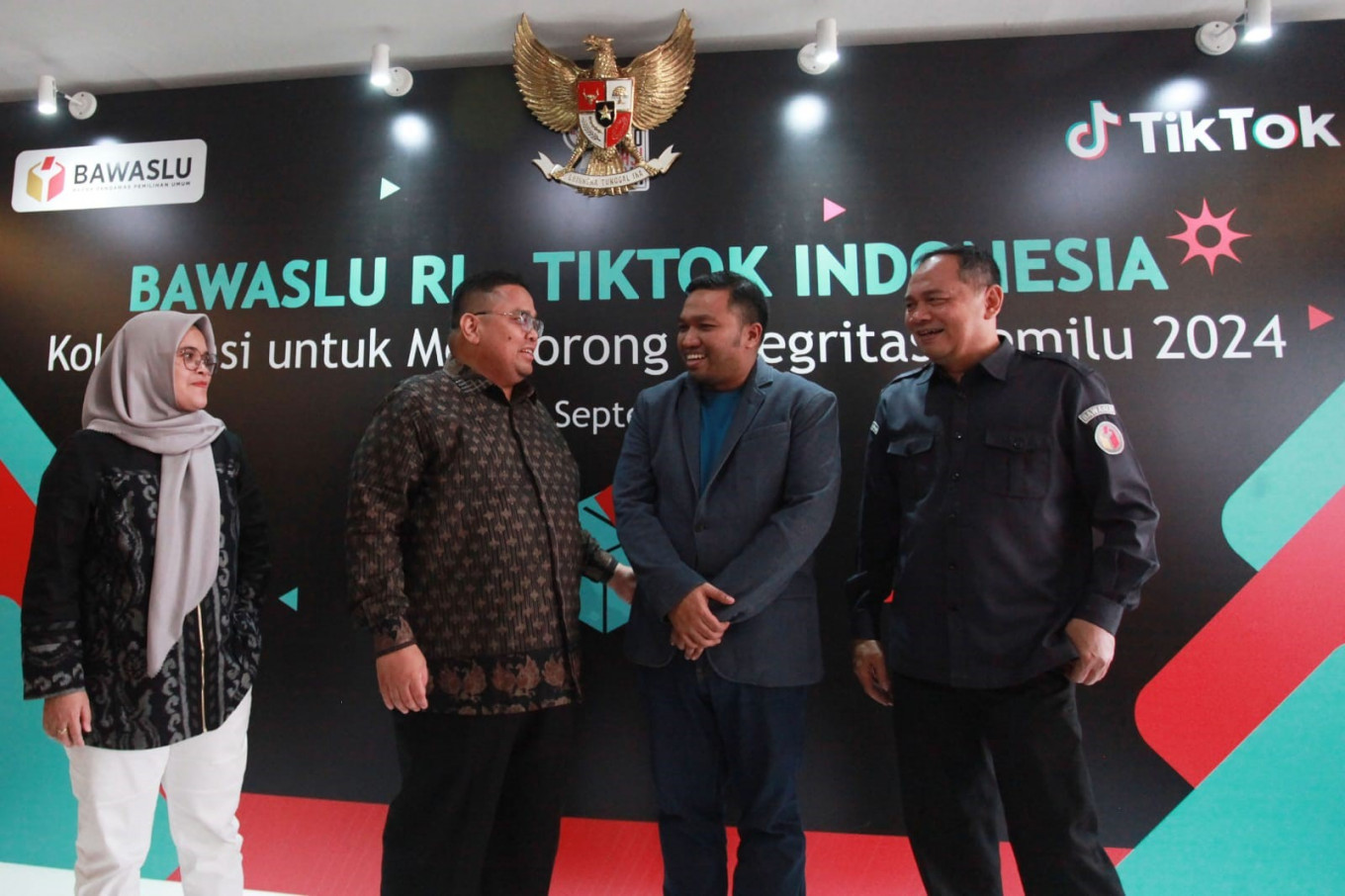Popular Reads
Top Results
Can't find what you're looking for?
View all search resultsPopular Reads
Top Results
Can't find what you're looking for?
View all search results2024 election: Bawaslu joins forces with communications ministry to tackle hoaxes
The amount of fake news that circulated during the 2019 general election was so massive that it eroded public trust in the General Elections Commission (KPU) and the Elections Supervisory Agency (Bawaslu).
Change text size
Gift Premium Articles
to Anyone
 .Elections Supervisory Agency (Bawaslu) member Lolly Suhenty (left), Bawaslu chairman Rahmat Bagja (second left) and Bawaslu secretary-general Ichsan Fuady (right) pose with TikTok Indonesia public policy and government relations head Firry Wahid at the Bawaslu’s national headquarters in Jakarta on Sept. 18, 2023, after signing a collaboration agreement on preventing online hoaxes related to the 2024 election. The agency is collaborating with the digital entertainment giant to combat the spread of misinformation and disinformation as well as to provide accurate information and educate the voting public on the 2024 election. (Antara/Reno Esnir)
.Elections Supervisory Agency (Bawaslu) member Lolly Suhenty (left), Bawaslu chairman Rahmat Bagja (second left) and Bawaslu secretary-general Ichsan Fuady (right) pose with TikTok Indonesia public policy and government relations head Firry Wahid at the Bawaslu’s national headquarters in Jakarta on Sept. 18, 2023, after signing a collaboration agreement on preventing online hoaxes related to the 2024 election. The agency is collaborating with the digital entertainment giant to combat the spread of misinformation and disinformation as well as to provide accurate information and educate the voting public on the 2024 election. (Antara/Reno Esnir)
T
he amount of fake news that circulated during the 2019 general election was so massive that it eroded public trust in the General Elections Commission (KPU) and the Elections Supervisory Agency (Bawaslu). To prevent this from happening again, the Bawaslu has partnered with various stakeholders to clamp down on misinformation, disinformation and hoaxes for the 2024 election.
"We are collaborating with the Communications and Information Ministry, social media platforms, mass media and content creators, as well as forming an elections task force together with the KPI [Indonesian Broadcasting Commission], the KPU and the Press Council," said Herwyn Malonda, a member of the Bawaslu’s human resources, organization and training division.
Herwyn urges all elements of society and all relevant parties to work together to monitor every stage of the 2024 election. He expects the spread of fake news to peak during the campaign season, two months before election day on Feb. 14.
"Furthermore, fake news may also be disseminated to [try and] make people reject the election results," he adds.
Thus far, the Bawaslu and its anti-hoax collaborators have been conducting media monitoring and extensively disseminating educational information on the election to counter the expected increase in the number of hoaxes.
The Bawaslu has also formed a social media monitoring task force with the KPI and the Press Council to minimize the sources of fake news, hate speech and issues related to ethnicity, religion, race and groups (SARA), which are often appear online in an election year.
Bawaslu chairman Rahmat Bagja expressed his hope that the task force would make it easier to filter out fake news across social media platforms.
"The task force is formed as an educational tool, a source of accurate [and] positive news to minimize hoaxes," said Bagja.
Communications and Information Minister Budi Arie Setiadi welcomed the agency’s efforts to prevent all types of misinformation and disinformation. He noted that a rapid response was needed to prevent the viral spread of such content.
"As for the quick mechanism, if there is negative [content], it should be taken down [immediately]. In essence, we must agree that if there is such content, it should be removed within a certain period," said Budi.
During the 2019 election, the ministry’s Kominfo.go.id website tracked data on the spread of hoaxes. The highest number of hoaxes was recorded in April 2019, coinciding with the voting day of the presidential and legislative elections. It recorded 501 hoaxes that month alone, followed by 453 in March 2019 and 402 in May.
The ministry also observed a steady increase in the number of hoaxes from August 2018 to April 2019, with the breakdown as follows: August 2018 (25 hoaxes), September (27), October (53), November (63) and December (75); January 2019 (175), February (353), March (453), April (501), May (402), June (330), July (348), August (271) and September (280).
The communications ministry also released data on the number of online hoaxes related to the 2024 election it had recorded from Jan. 19, 2022 to Oct. 5, 2023, totaling 81 hoaxes. This August 2023 saw the highest number of hoaxes at 18, with this year’s monthly breakdown as follows: January (1), February (1), March (8), April (1), May (5), June (9), July (14), August (18), September (13) and October (1).









